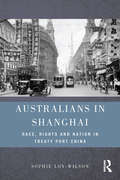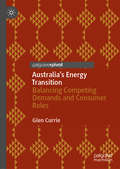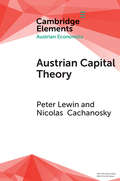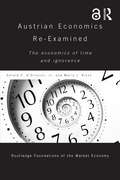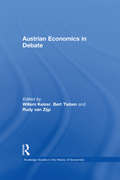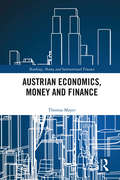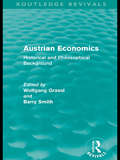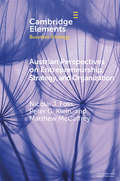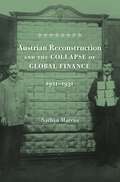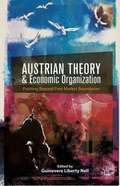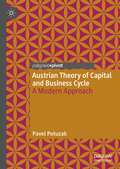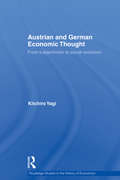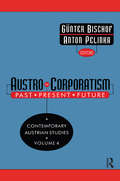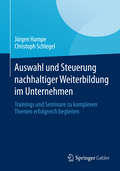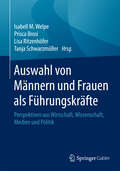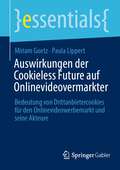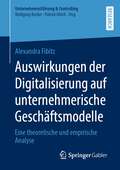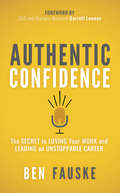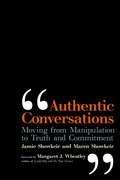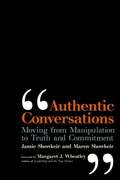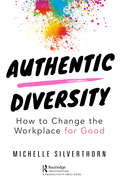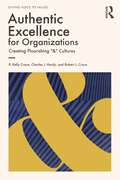- Table View
- List View
Australian Workplace Relations
by Peter Holland Julian Teicher Peter Holland Richard Gough Julian TeicherAustralian Workplace Relations explains the defining themes in workplace relations in the twenty-first century. It explores issues relating to employee voice, declining trade union membership, occupational health, disadvantaged workers and surveillance in the workplace. The treatment of each topic is placed in both a national and an international context. The book examines the effects on Australian workplace relations of globalisation, the changing international economy and the Global Financial Crisis. It provides a comprehensive examination of the Fair Work Act 2009. Case studies provide in-depth explorations of four important sectors of the economy: health, retail and hospitality, the public sector and motor vehicle components. The textbook includes additional resources for students and lecturers on a companion website: Power-Point slides, lists for further reading, additional case studies and links to websites. Comprehensive and fully cross-referenced, Australian Workplace Relations is an invaluable resource for upper-level undergraduate students of workplace, employee or industrial relations.
Australians in Shanghai: Race, Rights and Nation in Treaty Port China
by Sophie Loy-WilsonIn the first half of the twentieth century, a diverse community of Australians settled in Shanghai. There they forged a ‘China trade’, circulating goods, people and ideas across the South China Sea, from Shanghai and Hong Kong to Sydney and Melbourne. This trade has been largely forgotten in contemporary Australia, where future economic ties trump historical memory when it comes to popular perceptions of China. After the First World War, Australians turned to Chinese treaty ports, fleeing poverty and unemployment, while others sought to ‘save’ China through missionary work and socialist ideas. Chinese Australians, disillusioned by Australian racism under the White Australia Policy, arrived to participate in Chinese nation building and ended up forging business empires which survive to this day. This book follows the life trajectories of these Australians, providing a means by which we can address one of the pervading tensions of race, empire and nation in the twentieth century: the relationship between working-class aspirations for social mobility and the exclusionary and discriminatory practices of white settler societies.
Australia’s Energy Transition: Balancing Competing Demands and Consumer Roles
by Glen CurrieThis book studies Australia, a country characterized by the highest concentration of domestic photovoltaic systems. In addition, the high level of solar energy that Australia receives makes these systems a significant part of its energy mix. International electricity system managers take note; your systems are heading this way. The energy transition is an emerging field, and few texts have been published that can help energy planners as this book does. The research presented is sociotechnical in nature, and reveals that the main challenge in the energy transition is its emerging social role. Very few works combine the social and technical fields of energy. Given its scope, the book will appeal to readers interested in policy, regulation, and energy systems, including government employees involved in energy system management all around the world.
Austria: 2004 Article IV Consultation--Staff Report; Public Information Notice on the Executive Board Discussion; and Statement by the Executive Director for Austria
by International Monetary FundA report from the International Monetary Fund.
Austrian Capital Theory: A Modern Survey of the Essentials (Elements in Austrian Economics)
by Peter Lewin Nicolas CachanoskyThis Element presents a new framework for Austrian Capital Theory, starting from the notion that capital is value. Capital is the value attributed by the valuer at any moment in time to the combination of production-goods and labor available for production. Capital is the result obtained by calculating the current value of a business-unit or business-project that employs resources over time. It is the result of a (subjective) entrepreneurial calculation process that relates the flow of consumptions goods to the value of the productive resources that will produce those consumptions goods. The entrepreneur is a ubiquitous calculating presence. In a review of the development of Austrian Capital Theory, by Carl Manger, Eugen von Böhm-Bawerk, Ludwig von Mises, Friedrich Hayek, Ludwig Lachmann as well as recent contributions, the Element incorporates the seminal contributions into the new framework in order to provide a more accessible perspective on Austrian Capital Theory.
Austrian Economics Re-examined: The Economics of Time and Ignorance (Routledge Foundations of the Market Economy)
by Gerald P O'Driscoll Jr Mario RizzoAustrian Economics Re-examined: The Economics of Time and Ignorance is an expanded version of the 1996 edition of The Economics of Time and Ignorance. This work is a classic statement of the role of subjectivism, radical uncertainty and change through real time in Austrian economics specifically, and in modern economics more generally. The new book contains the full text and Introductions of the earlier edition as well as the comprehensive previously-unpublished essay "What is Austrian Economics?" and a new Introduction. The essay is a comprehensive overview of the central themes of the book from a somewhat different perspective than in the book itself. It supplements the analysis in the book. The new Introduction explains that the 2007-8 financial crisis and recent developments in behavioural economics have made the book more relevant than ever before. Austrian Economic Re-examined develops and systematizes the fundamental principles of the Austrian tradition to the analysis of rational expectations, business cycles, monetary theory competition and monopoly, and capital theory.
Austrian Economics in Debate (Routledge Studies in the History of Economics #12)
by Willem Keizer Bert Tieben Rudy Van ZijpThis book presents essays by an outstanding team of international specialists and covers a wide range of topics, including (inter alia) the relationships between the Austrian and Swedish theories of the business cycle, the on-going debates between Austrians and (Post) Keynesians, Schumpeter's 'Walrasian' stand in the socialist calculation debate, and the Austrian roots of Neo-Institutional economics. The studies stress the unique Austrian contributions to economic methodology and to the theory of entrepreneurship, while revealing unexpected methodological and philosophical similarities between, among others, Hayek and Marx.
Austrian Economics, Money and Finance (Banking, Money and International Finance)
by Thomas MayerThe financial crisis has exposed severe shortcomings in mainstream monetary economics and modern finance. It is surprising that these shortcomings have not led to a wider debate about the need to overhaul these theories. Instead, mainstream economists have closed ranks to defend existing theories and public authorities have expanded their interference in markets. This book investigates the problems associated with mainstream monetary economics and finance, and proposes alternatives based on the Austrian school of economics. This school emanated from the work of the nineteenth-century Austrian economist Carl Menger and was developed further by Eugen von Böhm-Bawerk, Ludwig von Mises, and Friedrich August von Hayek. In monetary economics, the Austrian school regards the creation of money by banks through credit extension as a key source of economic instability. From this follows the need for a comprehensive reform of our present monetary system. In a new monetary order, money could be issued by both public and private institutions, and there would be no need for fractional reserve banking. Instead of creating money, banks would intermediate it. In finance, the Austrian school rejects the notion of rational expectations and measurable risk. Individuals use their subjective knowledge to gather and evaluate information, and they act in a world of radical uncertainty. Hence, markets are not "efficient" nor can portfolios be built on the basis of known probability distributions of asset prices as described in the modern finance literature. This book explores the need for a new theoretical foundation for asset pricing and investment management that will give practitioners more useful orientation.
Austrian Economics: Historical and Philosophical Background (Routledge Revivals)
by Wolfgang GrasslFirst published in 1986, this book presents a reissue of the first detailed confrontation between the Austrian school of economics and Austrian philosophy, especially the philosophy of the Brentano school. It contains a study of the roots of Austrian economics in the liberal political theory of the nineteenth-century Hapsburg empire, and a study of the relations between the general theory of value underlying Austrian economics and the new economic approach to human behaviour propounded by Gary Becker and others in Chicago. In addition, it considers the connections between Austrian methodology and contemporary debates in the philosophy of the social sciences.
Austrian Perspectives on Entrepreneurship, Strategy, and Organization (Elements in Business Strategy)
by Nicolai J. Foss Peter G. Klein Matthew McCaffreyThe 'Austrian' tradition is well-known for its definitive contributions to economics in the twentieth century. However, Austrian economics also offers an exciting research agenda outside the traditional boundaries of economics, especially in the management disciplines. This Element examines how Austrian ideas play a key role in expanding the understanding of fields like entrepreneurship, strategy, and organization. It focuses especially on the vital role that entrepreneurs play in guiding economic progress by shaping firms and their strategic behavior. In doing so, it explains a wide range of contributions that Austrian economics makes to the understanding of key problems in management, while also highlighting many directions for future work in this inspiring tradition.
Austrian Reconstruction and the Collapse of Global Finance, 1921–1931
by Nathan MarcusAlthough some statesmen and historians have pinned Austria’s—and the world’s—interwar economic implosion on financial colonialism, in this corrective history Nathan Marcus deemphasizes the negative role of external players and points to the greater impact of domestic malfeasance and predatory speculation on Austrian political and financial decline.
Austrian Theory and Economic Organization
by Guinevere Liberty NellThe Austrian economic school famously predicted and explained the problems of calculation in a socialist society. With their concept of spontaneous order, they challenged mainstream economists to look beyond simplified static models and consider the dynamic and evolutionary characteristics of social orders. However, many feel that Austrians took their victory too far and became ideologically devoted to laissez-faire. Austrian Theory and Economic Organization is a collection of essays on problems and possibilities in economic organization, written by economists and political scientists with an interest in the dynamic and evolutionary nature of market economies. Each chapter explores areas of potential agreement between Austrian theory, market socialist economics, and other heterodox schools of economic and political science. The collection aims to bridge cultural and political divisions between free market advocates who stress individual rights and left-leaning thinkers who stress social justice and a culture of solidarity.
Austrian Theory of Capital and Business Cycle: A Modern Approach
by Pavel PotuzakThis book explores Austrian capital theory and Austrian business theory from the perspective of modern economics. Sustainable change within the production structure is examined in relation to time preference, the Böhm-Bawerkian theory of capital and interest, and the Hayek Triangle. In turn, the impact of monetary shocks and boom-bust cycles is detailed, with a particular focus on the Ricardo Effect, dynamics of money supply, and the natural rate of interest. This book aims to present a new framework for Austrian economics that will make these ideas applicable to both mainstream economic models and modern economists. It will be relevant to students and researchers interested in the history of economic thought and the political economy.
Austrian and German Economic Thought: From Subjectivism to Social Evolution (Routledge Studies In The History Of Economics Ser. #123)
by Kiichiro YagiThis book intends to renovate the view of social sciences in the German-speaking world. It explores the intellectual tension in the social science in Austria and Germany in the late-nineteenth and early-twentieth centuries. It deals with how the emergence of the new school (Austrian School) changed the focus of social science in the German speaking world, and how it prepared the introduction of an evolutionary perspective in economics, politics, and sociology. Based on (mostly hitherto unknown) primary evidence, this development is lively described in a series of encounters and decisions by each social scientists.
Austro-corporatism: Past, Present, Future
by Gunter BischofCorporatism was unpopular in the Europe of the past decade. During a time of neo-conservative resurgence in both the United States and the United Kingdom, macroeconomic steering and statist centralism and regulation were in disfavor. However, Austria's unique Sozialpartnerschaft, its famed system of tripartite informal and formal labor, business, and state cooperation, continued to prosper In spite of such powerful Anglo-American trends. Austro-Corporatism is the fourth volume in the interdisciplinary Contemporary Austrian Studies series. This effort in particular reflects the uniqueness of Austrian corporatism, and looks at its deep historical roots from a comparative continental European perspective.The contributors Include specialists on Austria from all parts of the world, making this a truly international effort. Andrei Markovits provides the larger European context for this analysis of Austrian corporatism. Emmerich Talos and Bernhard Kittel review the historical development of Austrian corporatism, going back to its nineteenth-century roots. Randall Kindley studies the Institutional framework of Austrian corporatism, particularly its post-World War II reincarnation. Hans Seidel looks at the subject from a neo-Keynesian economic perspective, and Ferdinand Karlhofer at the chances of Its survival in a changing international environment.Jonathan Petropoulos presents a fascinating biographical study of Nazi art plunderer Kajetan Muhlmann, and David McIntosh compares Eisenhower's policy vis-a-vis the small friendly countries of Lebanon, Costa Rica, and Austria. A special forum looks at the model character and appeal of tripartite Austrian cooperation among its new eastern democratic neighbors: the Czech Republic, Slovakia, Hungary, and Slovenia. A number of reviews of Austrian politics in 1994 complete the volume. Austro-Corporattsm will be of intense interest to foreign policy analysts, historians, and scholars concerned with the unique elements in Central European politics.
Auswahl und Steuerung nachhaltiger Weiterbildung im Unternehmen: Trainings und Seminare zu komplexen Themen erfolgreich begleiten
by Jürgen Hampe Christoph SchlegelDieses Werk zeigt erstmals, wie mit der Methode der "Empathischen Selbstreflexion" nachhaltige Veränderungen in Verhaltenstrainings erzielt werden. Anhand aktueller Erkenntnisse der Psychologie und der Komplexitätsforschung erläutern die Autoren den richtigen Umgang mit komplexen Themen. Beispiele aus der Trainingspraxis zeigen die richtige Auftragsklärung, die erfolgreiche Durchführung sowie die effektive Begleitung der nachfolgenden Transferarbeit. Damit werden wirksame Impulse und Ergebnisse für die Organisation erzielt.
Auswahl von Männern und Frauen als Führungskräfte: Perspektiven aus Wirtschaft, Wissenschaft, Medien und Politik
by Isabell M. Welpe Prisca Brosi Lisa Ritzenhöfer Tanja SchwarzmüllerExperten aus Wirtschaft, Wissenschaft, Medien und Politik beleuchten in diesem Buch die Auswahl und Beurteilung von Führungskräften umfassend und praxisnah. Wissenschaftliche Beiträge, Erfahrungsberichte und Interviews ermöglichen den Transfer zwischen Forschung und Praxis. Ein spezieller Fokus liegt auf dem Thema Frauen in Führung.
Auswirkungen der Cookieless Future auf Onlinevideovermarkter: Bedeutung von Drittanbietercookies für den Onlinevideowerbemarkt und seine Akteure (essentials)
by Miriam Goetz Paula LippertDrittanbietercookies ermöglichen Vermarktern eine fundierte Kampagnenanalyse und Zielgruppenbestimmung. Welche Auswirkungen hat der Wegfall von Cookies auf sie? Das essential beschreibt zunächst Cookies und deren aktuelle Einsatzfelder. Auf Basis von Experteninterviews mit Branchenkennern folgt dann ein Ausblick, welche Chancen und Risiken mit dem Wegfall der Cookies für die Vermarkterbranche und Endverbraucher einhergehen und welche Alternativen zu Drittanbietercookies existieren.
Auswirkungen der Digitalisierung auf unternehmerische Geschäftsmodelle: Eine theoretische und empirische Analyse (Unternehmensführung & Controlling)
by Alexandra FibitzDieses Buch umfasst sowohl eine theoretische als auch empirische Untersuchung der Auswirkungen der Digitalisierung auf unternehmerische Geschäftsmodelle. Alexandra Fibitz entwickelt hierzu einen wissenschaftlich-fundierten Bezugsrahmen, welcher den Zusammenhang des Megatrends der Digitalisierung auf die Transformation und Innovation von unternehmerischen Geschäftsmodellen in der Theorie und Praxis untersucht. Die gewonnenen theoretischen Erkenntnisse konfrontiert die Autorin mit drei empirischen Untersuchungen. Aus diesen Erkenntnissen leitet sie sowohl für die Wissenschaft weitere Forschungsfelder als auch Handlungsempfehlungen für die Unternehmenspraxis in Form einer Checkliste ab.
Auswirkungen von Covid-19 auf die Wirtschaft: Ein maschinen-generierter Literaturüberblick
by Deegvijay ShimpiDieses Buch vermittelt Wissen rund um die Covid-19-Pandemie und ihre Auswirkungen auf Unternehmen und gibt einen Überblick über die Herausforderungen und Veränderungen während und nach der Pandemie sowie darüber, wie sich die Wirtschaft weltweit neu umgestaltet. Es besteht im Wesentlichen aus drei Themenschwerpunkten: Covid-19 und geschäftliche Herausforderungen, Erholung der Unternehmen von Covid-19 sowie Zukunft und neue Geschäftsmöglichkeiten. Das Buch enthält einen systematischen Literaturüberblick auf der Grundlage maschinell generierter Inhalte. Fragen und zugehörige Schlüsselwörter wurden für die Maschine vorbereitet, die sie abgefragt, entdeckt, zusammengestellt und durch Clustering mit künstlicher Intelligenz (KI) strukturiert hat. Springer Nature hat in den letzten Jahren viel zu dem Thema in Zeitschriften veröffentlicht, so dass die Herausforderung für die Maschine darin bestand, die relevantesten Inhalte zu identifizieren und sie in einer strukturierten Weise zu präsentieren. Die automatisch generierten Literaturzusammenfassungen dienen Lesern aus den Bereichen Wirtschaft und Management, aber auch Wissenschaftlern und Studenten, um sich schnell einen Überblick über die aktuelle Entwicklung des Themas zu verschaffen, aber auch als Anregungen und Impulse für Forschungsfragen, neue Strategien sowie für mögliche Lösungen in schwierigen Geschäftsphasen und Situationen.
Authentic Confidence: The Secret to Loving Your Work and Leading an Unstoppable Career
by Ben FauskeWithin Authentic Confidence, Ben Fauske incorporates successfully proven strategies based on research and real-life stories that guide leaders to a confidence breakthrough. Ego, arrogance and narcissism commonly describe ineffective leadership. Nobody likes a show off, but it also doesn’t work to shrink into the shadows. Ben Fauske had significant confidence issues early in his career and he was miserable. After years of struggle, he discovered a pattern that some of the greatest recording artists have used to overcome confidence issues and find success. He called it Authentic Confidence, and the process dramatically improved his career. Since, Ben has taught thousands of leaders the step-by-step instructions to find and communicate confidence in every situation. He shows readers these instructions and communication strategies in Authentic Confidence. It includes a self-assessment called the Authentic Confidence Quotient along with a career building tool called the Career Confidence Guide. Authentic Confidence has been proven to elevate the influence of leaders and enhance employee engagement at all levels.
Authentic Conversations: Moving from Manipulation to Truth and Commitment
by James D. Showkeir Maren S. ShowkeirIn this groundbreaking new book, the Showkeirs take something people typically think of as merely functional—ordinary conversations—and show the power they have to create, sustain, and change the very nature of workplace culture. Conversations can lead to an engaged and energized workforce, or to one that is alienated and uninspired. If you want to change the culture you must change the conversations. All too often workplace conversations—between managers and direct reports, peer-to-peer, or with external stakeholders— create parent-child relationships. People hide facts, sugarcoat reality and claim helplessness to try to control interactions and get what they want. The Showkeirs expose the destructiveness of these manipulative conversations, and demonstrate how we can move to honest and authentic interactions that create adult relationships. By intentionally and thoughtfully changing conversations, organizations will engender increased commitment, true accountability, and improved workplace performance. Drawing on more than 25 years of experience as organizational consultants, their book offers examples of parent-child and adult-adult workplace conversations in a variety of settings, circumstances and industries. They also provide a hands-on guide, including sample scripts, for dealing with a host of potentially difficult conversations. Authentic Conversations goes to the heart of why so many people today are disengaged, uninspired, and uncommitted to their organization’s success. It challenges the conventional wisdom about managing people and sets out specific, concrete ways to consciously make conversations the primary driver for change.
Authentic Conversations: Moving from Manipulation to Truth and Commitment
by Jamie Showkeir Maren ShowkeirThrough over twenty-five years of work as organizational consultants, Maren and James Showkier have discovered that conversation has the power to create, sustain or change organizational culture.
Authentic Diversity: How to Change the Workplace for Good
by Michelle SilverthornAmerica is about to become a minority-majority nation. And yet, companies across the country do not reflect the transforming demographics of our nation, particularly with leadership. For decades, leaders have heard variations on the same theme on how to increase workplace diversity. It’s time to stop following failing trends. It’s time to lead change. In Make Diversity Matter, culture change expert and renowned speaker, Michelle Silverthorn, explains how to transform diversity and inclusion from mere lip service into the very heart of leadership. Following the journey of a young Black woman in the workplace, leaders learn the old rules of diversity that keep failing her and millions like her again and again, and the new rules they must put in place to make equity and inclusion a reality for everyone. A millennial, immigrant, and Black woman in America, Michelle Silverthorn will transform your understanding of diversity and inclusion in the workplace and equip you with the skills to successfully recruit, retain, and lead a diverse workforce. Change the rules, change the world. That’s how great leaders make diversity matter for good.
Authentic Excellence for Organizations: Creating Flourishing "&" Cultures (Giving Voice to Values)
by R. Kelly Crace Charles J. Hardy Robert L. CraceAuthentic Excellence for Organizations explores organizational culture from a values-based perspective and applies the psychological principles of values-based flourishing to organizations. Integrating the principles of Giving Voice to Values (GVV) and Authentic Excellence (AX), this book provides a process that details how organizations can harness their team’s inherent wisdom to flourish through the relentless pace and pressure of today’s world. Moving beyond team-building strategies and programming, this book helps develop confidence in managing the tensions inherent in organizations. It explores: The difference between moral values and personal values; How both can be effectively expressed and managed in organizations; The possibilities of shifting from a fear-based culture of "Or" to an inclusive and values-centred culture of "&"; and How to practically create flourishing "&" cultures using the GVV model. How to create an organizational culture that effectively sustains "&s" like competitive & collaborative, productive & fulfilled, and innovation & tradition. This book is intended for organizational leaders, members, and HR managers looking to develop strong and thriving teams. It also aligns with required or recommended reading for secondary or undergraduate courses that explore values, leadership, organizational development and performance, decision making, ethics, and entrepreneurship.

